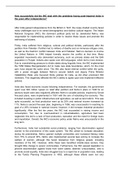How successfully did the INC deal with the problems facing post-imperial India in
the years after independence?
After India gained independence from the British in 1947, the newly divided country faced
many challenges due to its varied demographics and distinct cultural regions. The Indian
National Congress (INC), the dominant political party led by Jawaharlal Nehru, was
responsible for implementing policies in order to resolve these issues and promote the
well-being of citizens.
Firstly, India suffered from religious, cultural and political divides, particularly after the
partition from Pakistan. Partition led to millions of deaths and an immense refugee crisis,
as well as the Kashmir conflict between India and Pakistan. Nehru’s decision to involve
the United Nations in 1948 helped formally resolve the conflict at that time. Many
separatist movements also demanded autonomy, such as princely states and the Sikh
population in Punjab. Indians also spoke over 200 languages, which led to more division.
Due to overwhelming pressure to divide states along linguistic lines, the INC implemented
the 1956 States Reorganisation Act to make new state boundaries, which, for the most
part, have stayed the same since. The INC also faced internal conflict within the party,
with a power struggle between Nehru’s secular beliefs and deputy Prime Minister
Vallabhbhai Patel, who favoured Hindu policies for India, as did other prominent INC
members. This negatively affected the INC’s ability to agree upon and implement effective
policies.
India also faced economic issues following independence. For example, the government
spent over 940 million rupees on relief after partition and Nehru’s plans in 1946 for an
advisory board were also negatively affected. Nehru’s socialist policies, inspired by Soviet
five-year plans, were implemented in 1951 with the aim of rebuilding the economy. This
included investing in public infrastructure and agriculture, as well as land reform. This was
quite successful, as food production went up by 25% and national income increased by
11%. Nehru’s second five-year plan, beginning in 1956, was unsuccessful in reaching its
goal of a 25% increase in national income; however, it did increase industrial production
significantly. After the first ten years, the INC had succeeded in raising income and
consumption. Yet, due to overinvestment in industrialisation, agriculture had been
neglected; this led to a lack of food production, starvation and the need for foreign loans
and importation. Overall, the INC’s economic policy under Nehru was unsuccessful in the
long term.
Furthermore, India had substantial social problems, ranging from discrimination against
women to the prominence of the caste system. The INC aimed to increase education;
during his premiership, Nehru opened multiple universities and increased literacy rates
from 15% to around 30%. Nehru also implemented several laws aiming to increase the
welfare of women, although this faced resistance from religious people, including
members of the INC. However, while these laws benefited middle-class women, they
brought little change to poorer communities. Furthermore, the INC passed legislation to
prevent discrimination against those from lower castes, deemed ‘untouchables,’ and to
promote social equality. India also struggled due to a rapid rise in population size, leading
to the Family Planning Programme in 1952, although these efforts were not very




